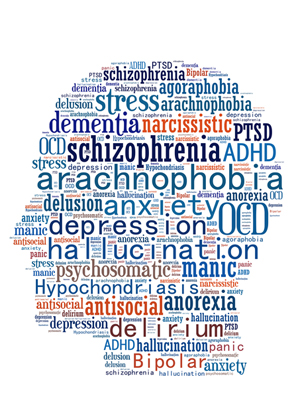I often speak about the Church’s response to “mental illness.” Often used interchangeably are words like “mental health issues” or “emotional struggles.” Defining these terms is important in this dialogue, as doing so ensures that we all know exactly what types of problems we are trying to address.
The Diagnostic and Statistical Manual, 5th Edition (DSM-5) states this definition:
“A mental disorder is a syndrome characterized by clinically significant disturbance in an individual’s cognition, emotion regulation, or behavior that reflects a dysfunction in the psychological, biological, or developmental processes underlying mental functioning” (p. 20).
The term “mental illness” can conjure up a variety of images, including other problems (such as homelessness or addiction issues) that sometimes co-occur with severe and chronic mental illnesses. Movies like A Beautiful Mind or Girl, Interrupted portray psychotic symptoms that are present with disorders such as schizophrenia. But are these mental models accurate when we think of the term “mental illness”? When we speak of the Church’s response to mental illness, are we simply trying to reach these severe cases?
Mental illness is far more common than we realize. According to the National Alliance on Mental Illness, in any given year 20% of American adults experience symptoms of a mental illness. This means that 1 in every 5 people are experiencing symptoms of depression, anxiety, bipolar disorder, adjustment disorders, PTSD and many other mental illnesses each year. Some may argue that those statistics might not represent the Church, as a faith and hope in Christ would offer a way out of these symptoms. However, if the Church is doing its job to reach the hurting, then our churches should be filled with more suffering, not less.
Notice that the statistic says 1 in 5 each year. That means that mental illness is not forever. Many people experience a single episode of depression that resolves with temporary medication and treatment and they never experience mental illness again. For others, mental illness is a chronic disease that requires life-long management. The Church can and should be a beacon of hope to the suffering, and hopefulness has a healing impact spiritually, psychologically, and biologically. But as with any illness, simply becoming a Christian will not make the symptoms go away. It is in this way that we as the Church must have a continual response of acceptance, love, and understanding to avoid stigmatizing and shaming those who continue to struggle throughout their journey with Christ.

